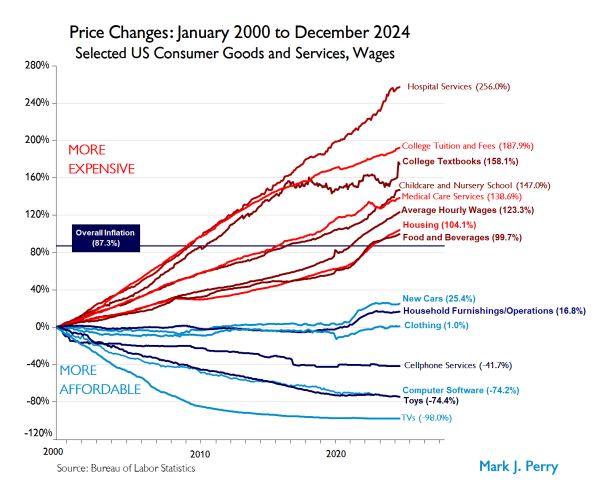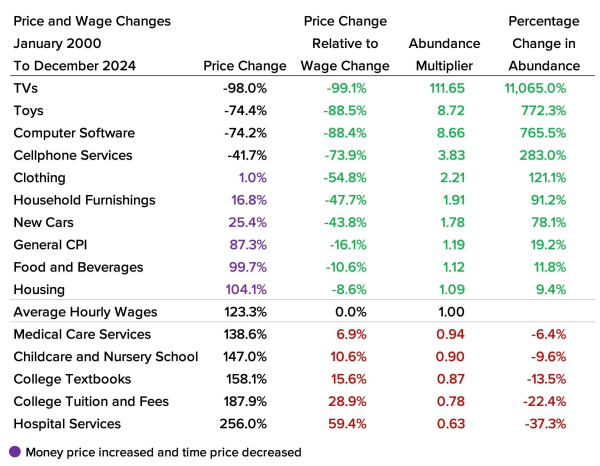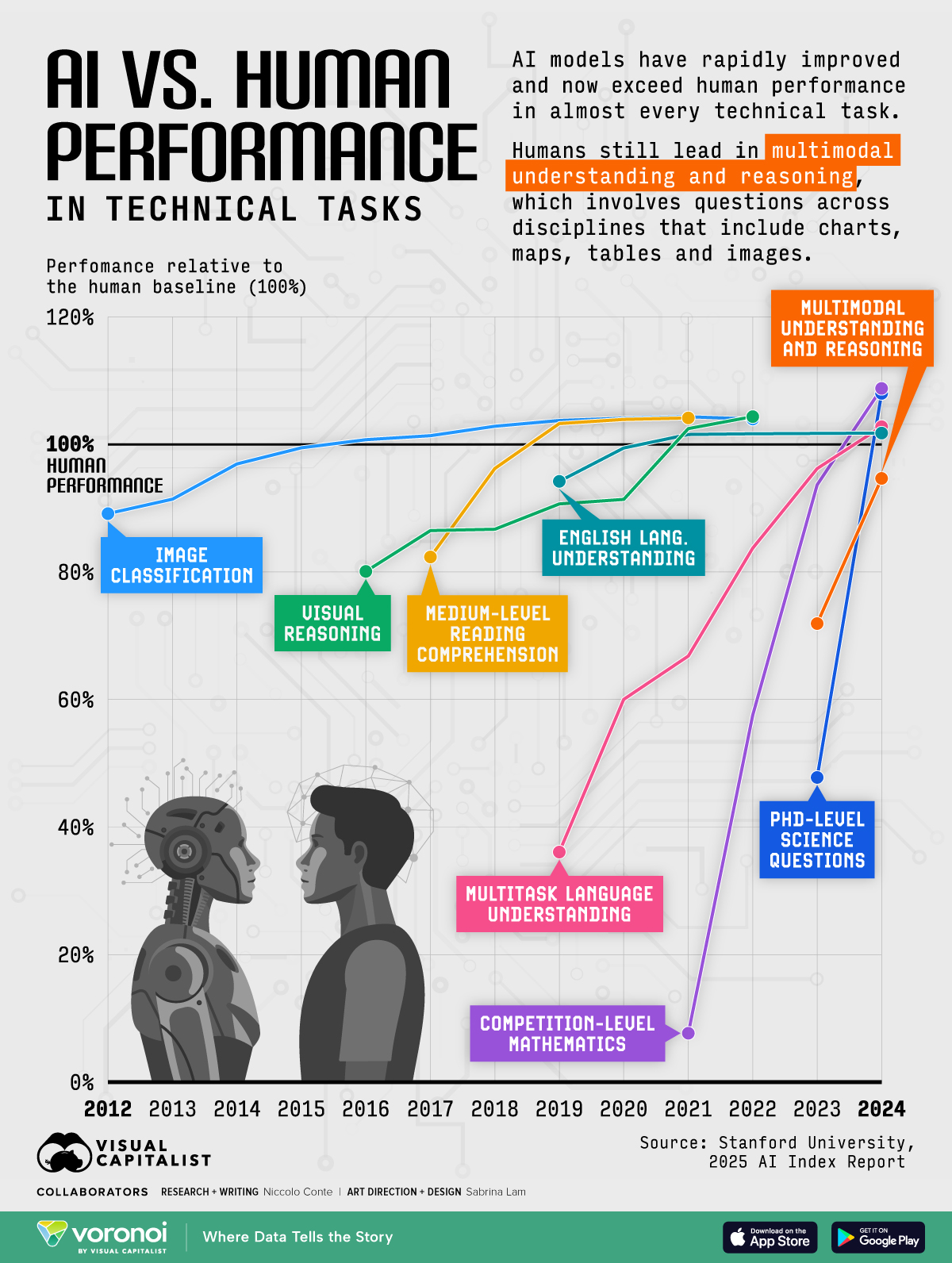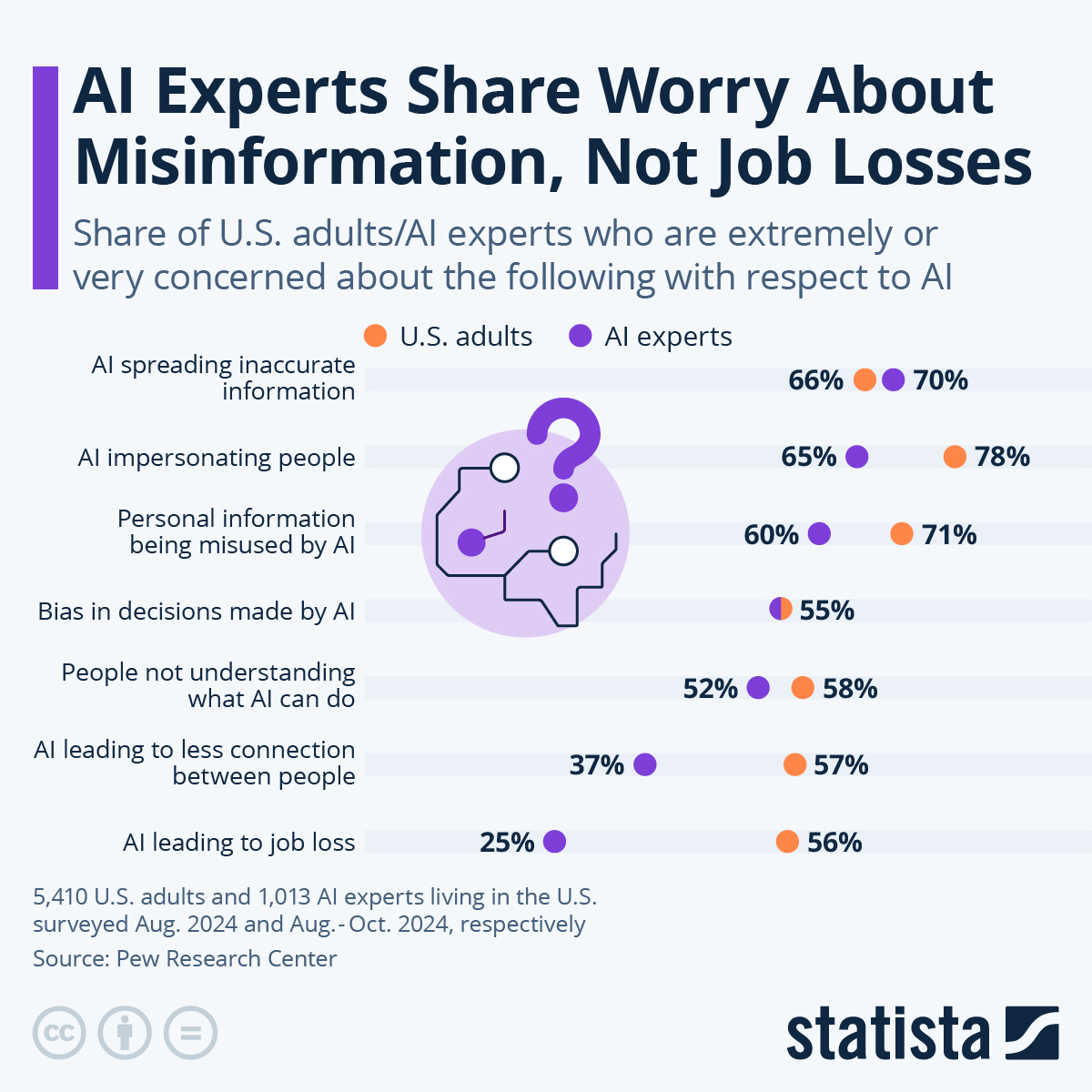In an era of economic uncertainty, few visualizations have captured the attention of economists, policymakers, and everyday consumers like the “Chart of the Century” created and named by Mark Perry, an economics professor and AEI scholar. This chart tracks the dramatic shifts in consumer prices across various sectors of the American economy over a quarter-century, revealing patterns that challenge conventional wisdom about inflation, purchasing power, and economic well-being.
The most current version reports price increases from 2000 through the end of 2024 for 14 categories of goods and services, along with the average wage and overall Consumer Price Index. Here are the key findings.
- Wage growth has outpaced inflation by a significant margin (123.3% vs. 90%) from 2000 to 2024, resulting in a 16.1% increase in real purchasing power.
- Sharp divergence exists between sectors: Technology and tradable goods have become much cheaper, while healthcare, education, and childcare costs soared.
- Market competition and trade liberalization drive price decreases, while regulated markets and limited competition contribute to price increases.
- Despite objective improvements in purchasing power, many consumers still feel financial pressure due to changing consumption patterns and “quality of life creep”.
- Policy challenges remain in balancing regulation with market forces, particularly in essential services like healthcare and education.
Core Economic Metrics: The Big Picture
The foundation of this analysis rests on three critical metrics that provide context for all other price trends:
|
Metric
|
Change
(2000-2024)
|
|
Consumer Price Index (CPI)
|
+90%
|
|
Average Hourly Income
|
+123.3%
|
|
Real Purchasing Power
|
+16.1%
|
From January 2000 to now, the CPI for All Items has increased by almost 90%. That is a big jump from its 59.6% level in 2019, when I first shared this chart.
These numbers tell a surprising story: despite widespread perceptions of economic hardship, Americans’ wages have grown significantly faster than inflation over these 24 years. This translates to a meaningful increase in real purchasing power – the ability to buy more goods and services with the same amount of work.
However, this aggregate picture masks dramatic variations across different categories of goods and services. Let’s explore these divergent trends.
The price of technology, electronics, and consumer goods — think toys and television sets — has tumbled over the past two decades. Why? These categories benefit from global competition, technological innovation, and manufacturing efficiencies.
Meanwhile, the cost of hospital stays, childcare, and college tuition, to name a few, have surged. Why? These sectors share important characteristics: they are typically non-tradable services (cannot be imported), operate in markets with limited competition, and are often subject to extensive regulation.
Below is Perry’s Chart of the Century. To help you interpret it better, lines above the overall inflation line have become functionally more expensive over time, and lines below the overall inflation line have become functionally less expensive.

via Human Progress
For context, at the beginning of 2020, food, beverages, and housing were in line with inflation. They’ve now skyrocketed above inflation, which helps to explain the unease many households are feeling right now. College tuition and hospital services also have continued to rise relative to inflation over the past few years.
Market Dynamics: Understanding the Divergence
What explains these dramatically different price trajectories? Here are several (but not all of the) key factors:
Factors Driving Price Increases
- Government regulation creating compliance costs and barriers to entry.
- Quasi-monopolistic markets with limited price competition.
- Non-tradeable services protected from foreign competition.
- Limited technological disruption in certain service sectors.
Factors Driving Price Decreases
- Foreign competition putting downward pressure on prices.
- Technological advancement reducing production costs.
- Manufacturing optimization increasing efficiency.
- Market competition forcing price discipline.
- Trade liberalization expanding access to global markets.
Looking at the prices that decrease the most, they’re all technologies. New technologies almost always become less expensive as we optimize manufacturing, components become cheaper, and competition increases. According to VisualCapitalist, at the turn of the century, a flat-screen TV would cost around 17% of the median income ($42,148). Since then, though, prices fell quickly. Today, a new TV typically costs less than 1% of the U.S. median income ($54,132).
We should also consider the larger trends. For example, In 2020, I asked what Coronavirus would do to prices ... and the answer turned out to be way less than expected. If you don’t look at the rise in inflation but instead the change in trajectories, very few categories were heavily affected. While hospital services have increased significantly since 2019, they were already rising. There were some immediate impacts, but they went away relatively quickly.
Another thing to consider is average hourly income. Since 2000, overall inflation has increased by 87.3%, while average hourly income has increased by 123.3%. This means that hourly income increased 38% faster than prices (which indicates a 16.1% decrease in overall time prices). You get 19.2% more today for the same amount of time worked ~24 years ago. This represents a mild increase in abundance since last year.

via Human Progress
Although 10 of the 14 items rose in nominal prices over the past 24 years, only five had a higher time price when accounting for the 123.3 percent increase in hourly wages. Those items were medical care services, childcare and nursery school, college textbooks, college tuition and fees, and hospital services.
The Consumer Experience: Perception vs. Reality
It’s interesting to look at data like that, knowing that the average household is feeling a “crunch” right now.
My guess is that few consumers distinguish between perception and reality. However, feeling a crunch isn’t necessarily the same as being in a crunch.
For instance, we must account for ‘quality of life creep,’ where people tend to splurge on luxuries as their standard of living improves. With the ease of online shopping and access to consumer credit, it has become increasingly easy to make impulse purchases, leading to reduced savings and feelings of financial scarcity. This phenomenon is a function of increased consumption (rather than inflation), yet it still leaves consumers feeling like they’re struggling to make ends meet. Our sense of what’s normal has risen, and that’s hard to unlearn.
Perry’s ‘Chart of the Century’ reveals the complex relationships between inflation, consumption, and economic growth. While households may feel financial strain, the data shows that income has outpaced inflation, and technology has made many goods more affordable. Nonetheless, there is still a real sense of economic struggle. Especially in these last few months.
Economic Patterns: Regulated vs. Free Markets
A clear pattern emerges when examining the relationship between market structures and price trends.
Regulated Markets (like healthcare and education) tend toward higher prices over time, feature less price competition, and offer limited consumer choice.
Free Markets, show price decreases over time, feature greater competition, and provide consumers more options.
This pattern raises important questions about the role of regulation in various economic sectors and the balance between consumer protection and market efficiency.
With that in mind, how can policymakers address sectors experiencing significant price hikes, such as healthcare and education, without stifling innovation in tradable goods and services?
Future Outlook
Beyond all that, here are three other key trends to watch.
- AI Disruption: Telemedicine and online education could bend healthcare/education cost curves.
- Trade Wars: New tariffs risk reversing tech price declines (e.g., proposed tariffs on Chinese electronics).
- Generational Shifts: Millennials prioritize experiences over goods, potentially easing service demand.
As we continue to innovate and policy changes, it will be interesting to see if we can make essential services as dynamically competitive as consumer electronics. While America is one of the best countries in the world in countless ways, we do lag behind several countries in healthcare and education.
Onwards.


The Rise of AI Art and Its Implications
The last time I talked about AI Art specifically was in 2022 when Dall-E was just gaining steam. Before that, it was 2019, when AI self-portraits were going viral.
On both occasions, it still felt like the relative infancy of the technology. I compared it to VR getting another 15 minutes of fame.
The images at the time weren’t fantastic, but it was a massive step in AI’s ability to understand and translate text into a coherent graphic response. The algorithms still didn’t really “understand” the meaning of images the way we do, and they were guessing based on what they had seen before - which was much less than today’s algorithms have seen. They were also much worse at interpreting images. As such, when you tried to use AI to recreate an image, there were a lot of hallucinations. The algorithms were essentially a brute-force application of math masquerading as intelligence.
Fortunately, AI imagery has come a long way since then. However, with that improvement comes more ethical concerns.
The rise of AI-generated art has sparked a complex and ongoing ethical debate, with compelling arguments on both sides. At the heart of the discussion lies the question of authorship, originality, and the impact of automation on human creativity and labor.
Proponents of AI art argue that it represents a powerful extension of human imagination. Just as past innovations—such as photography, digital editing, or sampling in music—were initially met with skepticism, Advocates argue AI-generated art is simply the next evolution in the artistic toolkit, and it democratizes access to artmaking. As a result, those with less skill - or time - can explore new styles, generate concepts, and be creative in a new form. To this end, they see AI not as a threat but as a collaborator—another brush or chisel in an artist’s hand.
However, critics raise concerns about the ethical implications of AI art, particularly in how these models are trained. Many AI systems are built on vast datasets scraped from the internet, including artwork by human creators who were neither consulted nor compensated, leading to accusations of IP theft. Moreover, they argue it sets a dangerous precedent where creative works can be replicated and commodified without consent or attribution. Lastly, on the idea of democratization, they would argue that art is already accessible to all and that people should be willing to explore skills not only to be good at them but to enjoy them.
The most recent trend has been a great example of this argument. The launch of OpenAI’s new image generator, powered by GPT-4, has empowered users to transform their photos into various famous media themes - like Renaissance paintings or Studio Ghibli anime images - which ironically goes against the ethos of Studio Ghibli and Hayao Miyazaki. The studio is known for its commitment to the craft, with carefully animated and hand-drawn scenes. Their films are known for glorifying nature and living in harmony with it. Miyazaki also believes that AI art is disrespectful to the “life” found in human-created art.
I’m a massive fan of AI - and even AI art ... but as the technology continues to evolve, society must grapple with how to integrate these tools in ways that honor both progress and the rights of the artists (and people) whose work—and livelihoods—may be at stake.
What do you think?
Posted at 01:07 AM in Art, Business, Current Affairs, Film, Gadgets, Games, Ideas, Just for Fun, Market Commentary, Movies, Music, Pictures, Science, Web/Tech | Permalink | Comments (0)
Reblog (0)